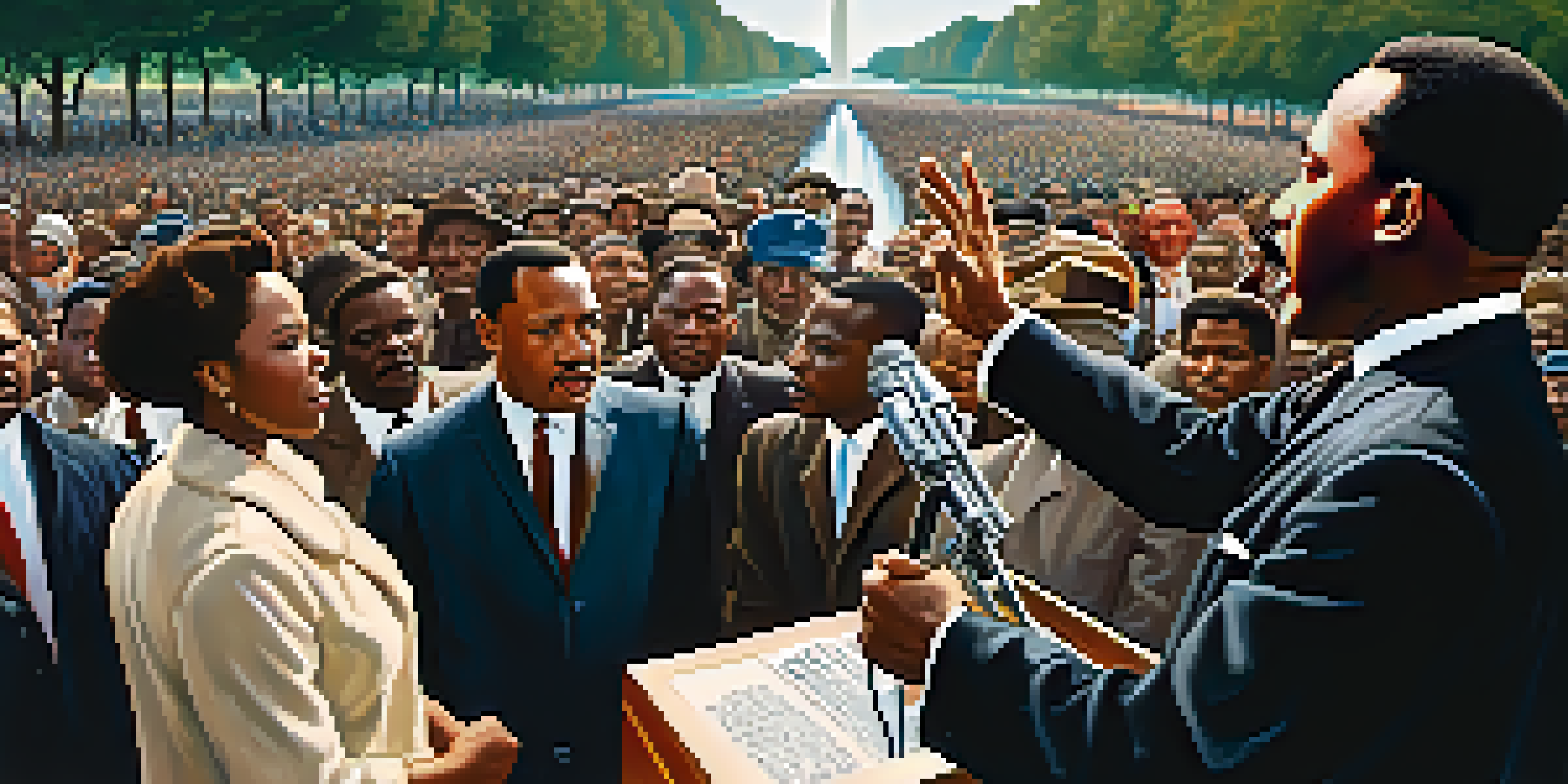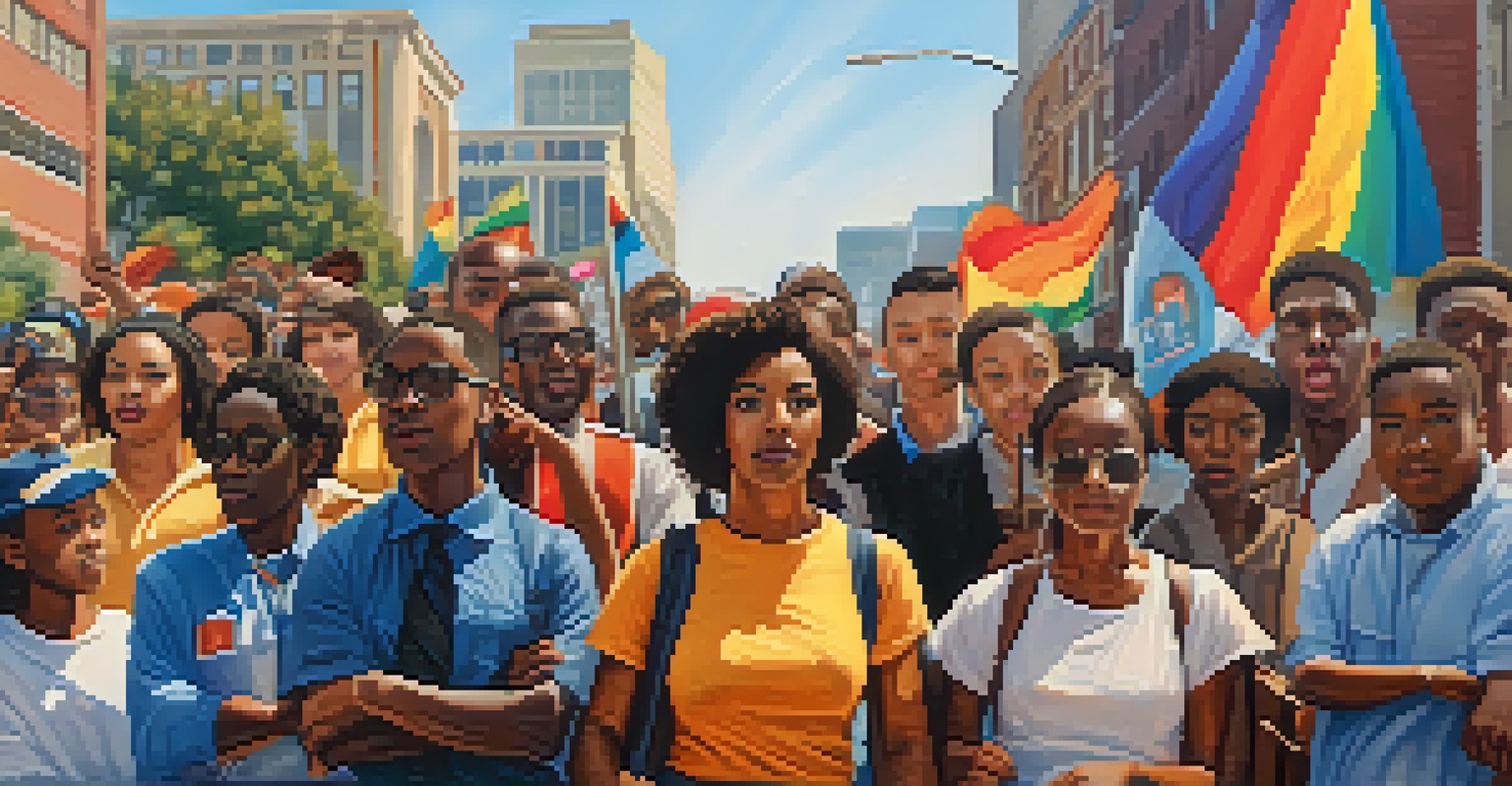Key Figures: Atlanta's Leaders in the Civil Rights Struggle

Martin Luther King Jr.: The Face of the Movement
Martin Luther King Jr. is perhaps the most recognizable figure in the civil rights movement, and for good reason. Born in Atlanta in 1929, he emerged as a powerful voice advocating for nonviolent resistance against racial discrimination. His leadership during the Montgomery Bus Boycott and his role in founding the Southern Christian Leadership Conference (SCLC) significantly shaped the movement's direction.
Injustice anywhere is a threat to justice everywhere.
King's famous 'I Have a Dream' speech delivered during the 1963 March on Washington resonated across the nation, inspiring countless individuals to join the struggle for equality. His commitment to love and nonviolence became a cornerstone of the movement, drawing attention to the injustices faced by African Americans. Today, his legacy lives on, reminding us of the power of peaceful protest.
Atlanta honors King through various memorials, including the Martin Luther King Jr. National Historical Park, which celebrates his life and teachings. His impact transcends generations, urging future leaders to continue the quest for justice and equality, making him a timeless symbol of hope.
Rosa Parks: The Catalyst for Change
Rosa Parks, often celebrated as 'the mother of the civil rights movement,' played a crucial role in sparking widespread activism. Though her act of defiance on a Montgomery bus in 1955 happened outside Atlanta, her influence rippled throughout the city and beyond. Parks' refusal to give up her seat became a powerful symbol, igniting the Montgomery Bus Boycott and inspiring many in Atlanta to stand against segregation.

Parks' bravery encouraged leaders like King to organize and mobilize grassroots movements across the South. In Atlanta, her legacy inspired countless demonstrations and initiatives aimed at dismantling systemic racism. Her steadfast commitment to civil rights demonstrated how one person's courage can ignite a movement and encourage others to fight for justice.
King's Legacy of Nonviolence
Martin Luther King Jr.'s dedication to nonviolent resistance and his influential 'I Have a Dream' speech motivated countless individuals to join the fight for racial equality.
Today, Parks is celebrated in Atlanta and across the nation, with statues and educational programs dedicated to her legacy. Her story serves as a reminder that change often begins with a single act of courage, encouraging individuals to challenge injustice wherever they see it.
John Lewis: A Fearless Advocate for Justice
John Lewis, a key figure in the civil rights movement, dedicated his life to fighting for racial equality. Born in Troy, Alabama, he moved to Atlanta to attend Morehouse College, where he became involved in activism. As the chairman of the Student Nonviolent Coordinating Committee (SNCC), Lewis played an integral role in organizing sit-ins and freedom rides, directly challenging segregationist policies.
The power of the people is greater than the people in power.
One of Lewis's most notable contributions was his involvement in the Selma to Montgomery marches, where he faced violence and brutality on what became known as 'Bloody Sunday.' His courage and determination to march for voting rights showcased the struggle for equality that many faced in the South. Despite the challenges, Lewis remained steadfast in his commitment to nonviolence and justice.
Lewis's legacy is celebrated in Atlanta, where he served as a U.S. Congressman for over three decades. His life and work continue to inspire new generations of activists, reminding them that the fight for justice is ongoing and that every voice matters in the pursuit of equality.
Andrew Young: A Diplomat for Civil Rights
Andrew Young is a prominent figure in Atlanta's civil rights history, known for his dual roles as a civil rights leader and later as a diplomat. Initially, Young served as the executive director of the Southern Christian Leadership Conference, where he worked closely with Martin Luther King Jr. to organize nonviolent protests. His passion for justice and equality helped to shape significant civil rights legislation during the 1960s.
After the civil rights movement, Young transitioned into politics, becoming one of the first African Americans elected to Congress from Georgia since Reconstruction. His work in the U.N. as the U.S. Ambassador highlighted his commitment to international human rights, linking local struggles to global causes. Young's multifaceted career exemplifies how civil rights activism can extend beyond grassroots movements to influence policy on a larger scale.
Grassroots Activism Matters
Ella Baker's emphasis on grassroots organizing empowered ordinary people to lead the civil rights movement, demonstrating that collective action can drive significant change.
Atlanta honors Young's contributions through various initiatives, including the Andrew Young Foundation, which promotes social justice and leadership. His legacy continues to inspire leaders to advocate for change both locally and worldwide, reinforcing the idea that the fight for equality knows no borders.
Maynard Jackson: The First Black Mayor of Atlanta
Maynard Jackson made history as Atlanta's first African American mayor, serving from 1974 to 1982 and again from 1990 to 1994. His election marked a significant turning point, symbolizing progress in a city with a complex racial history. Jackson's leadership focused on economic empowerment and civil rights, aiming to bridge the gap between communities in a rapidly changing city.
During his tenure, Jackson implemented policies that promoted minority business ownership and expanded opportunities for African Americans in various sectors. He played a pivotal role in the development of Hartsfield-Jackson Atlanta International Airport, ensuring that the city's growth benefited all its residents. His commitment to inclusivity paved the way for future leaders and set a standard for equitable governance.
Today, Jackson's legacy is felt throughout Atlanta, where his contributions to civil rights and economic development are celebrated. His leadership serves as a reminder that political power can be a tool for social change, inspiring future generations to engage in civic activism.
Ella Baker: The Unsung Hero of the Movement
Ella Baker was a remarkable yet often overlooked leader in the civil rights movement, known for her grassroots organizing efforts. She believed in the power of collective action and was instrumental in founding the Student Nonviolent Coordinating Committee (SNCC). Baker's philosophy emphasized that ordinary people could enact change, and she encouraged young activists to take the lead in their communities.
Her approach to leadership was unique, as she often worked behind the scenes, empowering others rather than seeking the spotlight for herself. This emphasis on grassroots organizing helped to mobilize thousands of young people across the South, fostering a spirit of collaboration and mutual support. Baker's influence can still be seen in contemporary social justice movements, where community engagement remains a vital component.
Importance of Political Leadership
Maynard Jackson's historic election as Atlanta's first Black mayor highlighted how political power can promote civil rights and economic opportunities for marginalized communities.
Baker's legacy is celebrated through various initiatives that honor her contributions to civil rights. Her story serves as a powerful reminder that leadership comes in many forms, and that the strength of a movement often lies in its ability to uplift the voices of those who have been marginalized.
Xernona Clayton: A Pioneer for Equal Rights
Xernona Clayton is a trailblazer in the civil rights movement and a prominent figure in Atlanta's history. As a civil rights activist and television producer, she worked tirelessly to promote equality and representation for African Americans. Clayton was one of the first African Americans to work at a major television station in the South, using her platform to advocate for social justice and inclusivity.
Clayton's contributions extend beyond media; she was a key organizer of the Southern Christian Leadership Conference and played a significant role in the implementation of initiatives that addressed racial inequality. Her work helped to establish programs aimed at improving education and economic opportunities for African Americans in Atlanta. Clayton's dedication to uplifting her community has left a lasting impact on the city.

Today, Xernona Clayton's legacy is honored through various awards and recognitions celebrating her contributions to civil rights. Her story is a testament to the power of determination and the importance of using one's voice to effect change, inspiring future generations to continue the fight for equality.
Legacy of Atlanta's Civil Rights Leaders
The leaders of Atlanta's civil rights movement have left an indelible mark on the city and the nation. Their combined efforts in advocating for justice, equality, and social change continue to resonate today. From the peaceful protests led by King to the grassroots organizing championed by Baker, each figure contributed uniquely to the struggle, shaping the landscape of civil rights.
As we reflect on their legacies, it's essential to recognize the ongoing efforts to address racial inequality and social injustice. The fight for civil rights is far from over, and the lessons learned from these leaders serve as guiding principles for current and future activists. Their stories remind us that change requires collective action and unwavering commitment.
In Atlanta, the spirit of these leaders lives on, inspiring new generations to engage in the pursuit of equality. Museums, monuments, and educational programs dedicated to their lives serve as reminders of the sacrifices made for justice, urging us all to honor their legacy by continuing the fight for a more inclusive society.